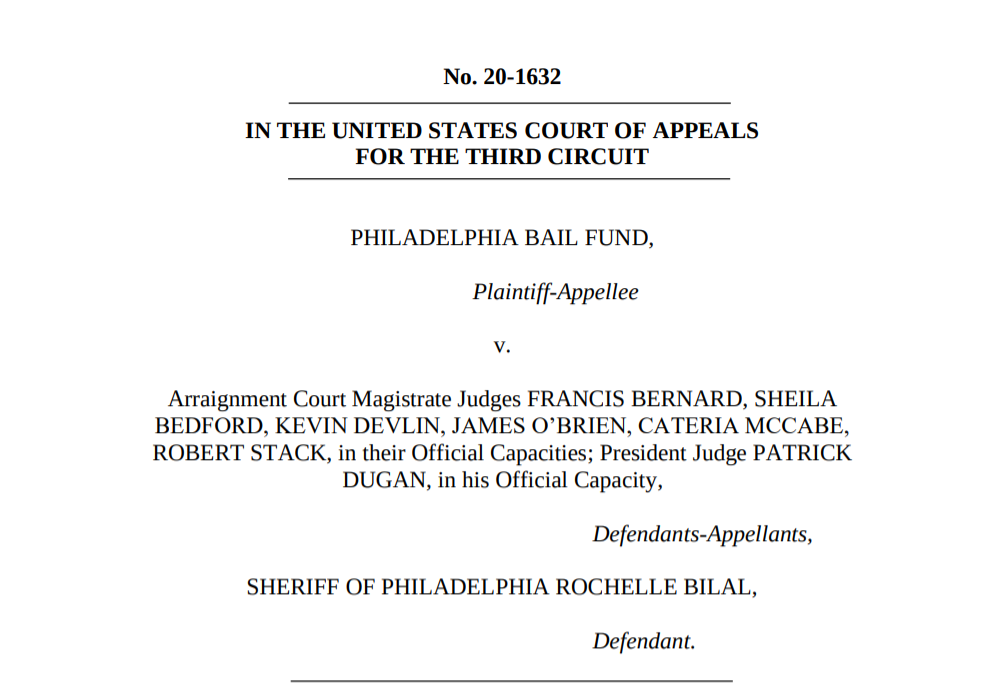News media have First Amendment right to record bail hearings, Reporters Committee brief argues

Update (Sept. 29, 2020): In a ruling issued on Sept. 29, the U.S. Court of Appeals for the Third Circuit reversed the district court’s decision, holding that the First Amendment does not mandate that courts create records of proceedings, nor that they allow members of the public to create such records.
The Reporters Committee for Freedom of the Press and a coalition of 14 media organizations filed a friend-of-the-court brief last week urging the U.S. Court of Appeals for the Third Circuit to rule that members of the public and press may record bail hearings in Pennsylvania courts, a timely issue given the recent arrests of many demonstrators protesting against police violence and racial injustice.
The Reporters Committee filed the brief in support of the Philadelphia Bail Fund, a nonprofit organization advocating for reform of the city’s bail system. In 2019, the Philadelphia Bail Fund filed a lawsuit challenging the constitutionality of certain Pennsylvania court rules that prevent the public, including the news media, from making audio recordings of bail hearings.
During bail hearings in Philadelphia, magistrate judges decide whether defendants should be eligible for release from custody before their court date, as well as how much, if anything, they should pay for their release.
A district court granted summary judgment for the nonprofit in February, ruling that arraignment court magistrate judges must either provide the public official audio recordings or transcripts of the proceedings, or allow members of the public and the news media to make their own audio recordings. The magistrate judges appealed the decision to the Third Circuit, arguing, among other things, that the First Amendment does not guarantee the right to record audio during court hearings.
The Reporters Committee’s brief urges the Third Circuit to affirm the district court’s ruling that the Philadelphia Bail Fund has a First Amendment right to record bail hearings.
“In the absence of an official transcript or recording, the challenged rules prohibiting journalists from recording bail hearings impermissibly burden their ability to report about such judicial proceedings for the benefit of the public at large,” the Reporters Committee argues in the brief.
Access to bail hearings is especially important in the wake of widespread protests sparked by the May 25 killing of George Floyd, a Black man, by a white Minneapolis police officer. The demonstrations have resulted in a wave of arrests across the country, with Philadelphia police arresting more than 100 people on May 31 alone.
It’s crucial that journalists are able to extensively cover bail hearings as the protests continue to unfold — and as protesters continue to face arrest. As the Reporters Committee argues in its brief, members of the media serve as surrogates for the public when they report on bail hearings, and the ability to make audio recordings allows journalists to report more comprehensively on the fast-moving proceedings, which take place 24 hours a day.
The brief notes that news reporting over the past few years has shown the public the disparate effects that the bail system can have on communities of color and the poor. Philadelphia is among the cities in which journalists have reported on the bail system.
For example, the 2019 Amazon docuseries “Free Meek,” which chronicled the 12-year legal battle of Philadelphia rapper Meek Mill, highlighted systemic flaws in the Pennsylvania state court bail and probation systems. Mill was convicted in 2008 on drug and firearm charges, but prosecutors claim there are “credibility issues” with the police officer who was a critical witness in the case. After the original conviction, Mill was caught in a probation trap, which is a problem for many in Pennsylvania, according to the Philadelphia Inquirer.
Read the full Reporters Committee brief.
The Reporters Committee regularly files friend-of-the-court briefs and its attorneys represent journalists and news organizations pro bono in court cases that involve First Amendment freedoms, the newsgathering rights of journalists and access to public information. Stay up-to-date on our work by signing up for our monthly newsletter and following us on Twitter or Instagram.